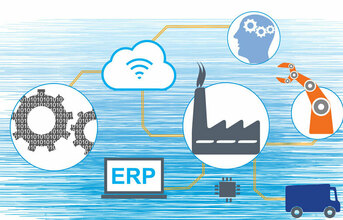
But the key point is that - Before machines talk to machines, people should talk to people. While automation may deem some jobs redundant, it creates jobs of higher value where there is a need for highly skilled individuals with advanced problem-solving metrics. The anticipation of the transition of Industry 4.0 has pushed organisations and governments to skill or reskill individuals to equip them to function in a technologically advanced environment. The consideration being given to skill development is immense as the people factor is at the core of every industrial revolution. If industry uses the opportunity of Industry 4.0, it will definitely gain competitiveness, so that this promises even more jobs in the future, but these jobs will look differently. IT skills even for shopfloor operators and line managers are mandatory, but will not replace process know how.
The concern about the loss of jobs may not be as widespread as previously thought. The truth is that as smart manufacturing and automation spreads further, new jobs that look nothing like previous ones might be born. This has been the case with every major industrial transition and the fourth industrial revolution will be no different. The associates need to be prepared for this change. To tackle this an intensive training program called the Industry4.0 academy has been launched in Bosch India. People thus will arise as key players in Industry 4.0 with advanced intelligence, multifaceted skill sets and higher flexibility.
The Industry4.0 journey is a leadership task as well. Since most of the leaders/managers don't usually belong to the "digital native" community, like Gen Y or Gen Z, a clear focus has to be given to their training as well. Without basic understanding of cloud solutions, open source software etc. they will be neither convinced nor enabled to drive the digital transformation. That's why Bosch India has conducted the first I4.0- training exclusively for the senior leaders.
Another important task and challenge is developing I4.0 at the local supplier's base. Unlike other regions, the supplier's base in India is fragmented and does not always have the capacity and necessary competencies in terms of connected industry. The solution is to develop I4.0 maturity together with the business partners.
Standards are very beneficial for this, e.g. energy management standard solutions etc. These standards/solutions must be developed and adapted in a network, where the industry, IT teams and universities work together. This is another area for improvement, especially collaboration between universities and industry.
Last but not the least, a new working culture is required. Hierarchical leadership does not work in the connected world, since with IT and manufacturing two different worlds come together with different innovation cycles, different methods (SCRUM vs. Value stream) and revolution meeting evolution. People need to work in a matrix structure with new responsibilities and flexible working styles, promoting failure culture. In an agile, connected industry learning from failures is an asset and needs to be cultivated as a habit. This too requires a systematic approach.
Smart Automation, combined with connectivity, can lead to more transparency, real-time data analysis and continuous improvements results in quality and environmental performances. Organisations need to strike the right balance between the levels of automation and the degree of human interface.
END



























